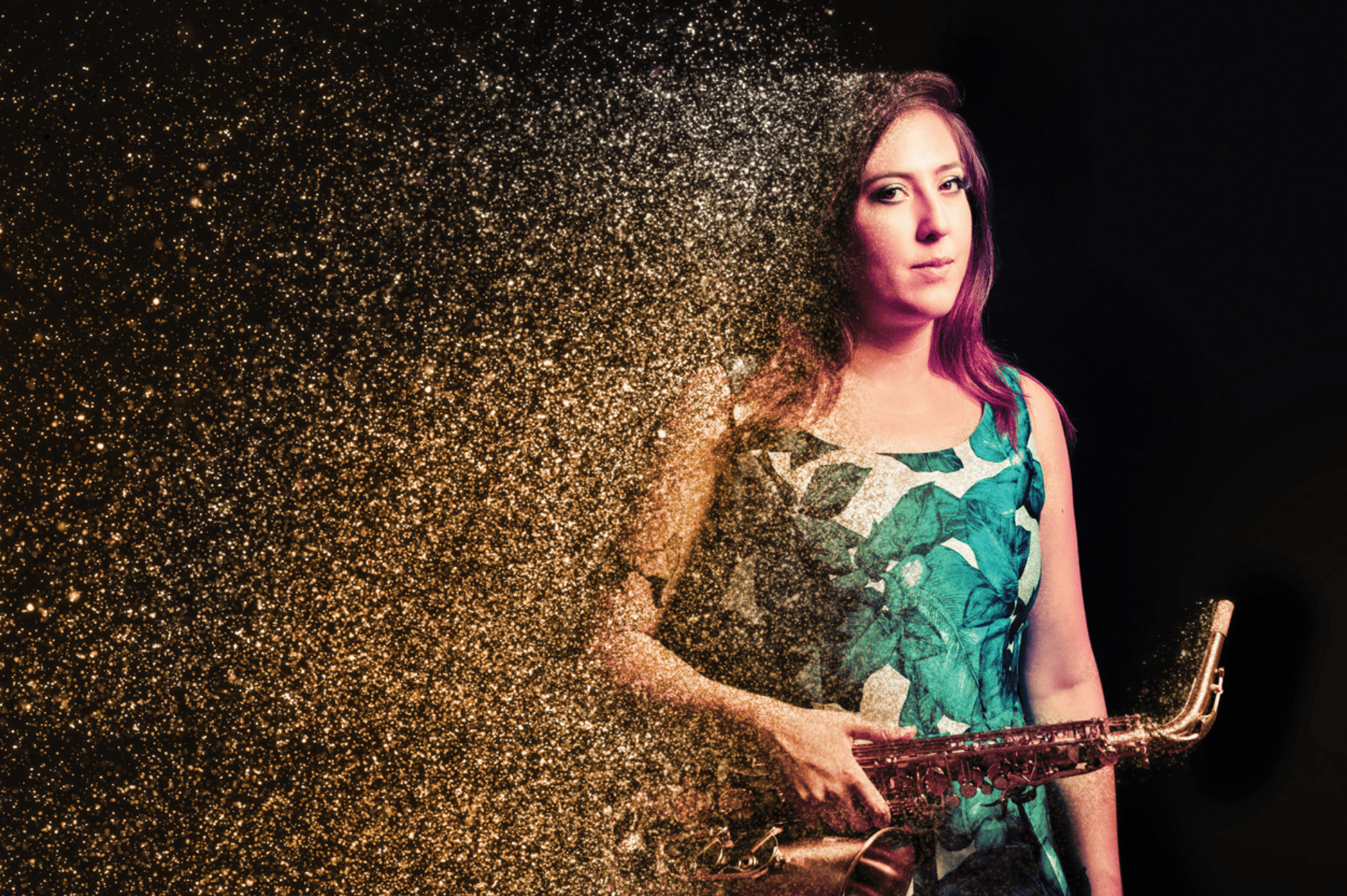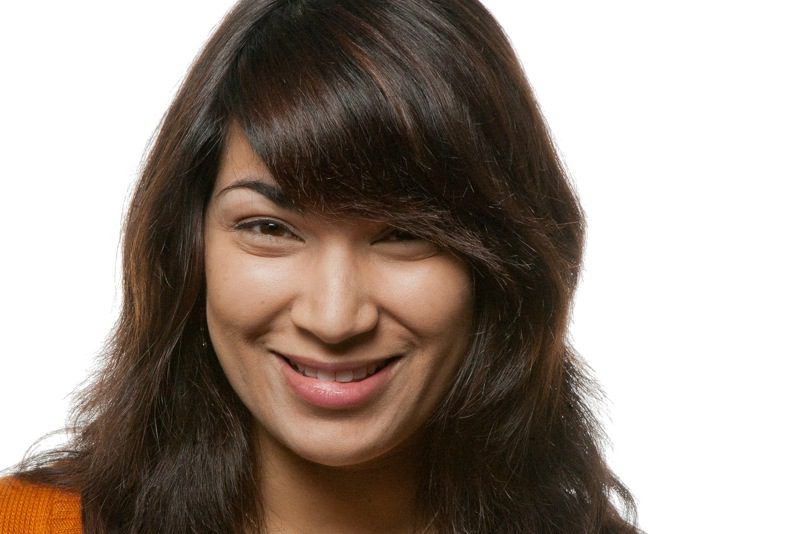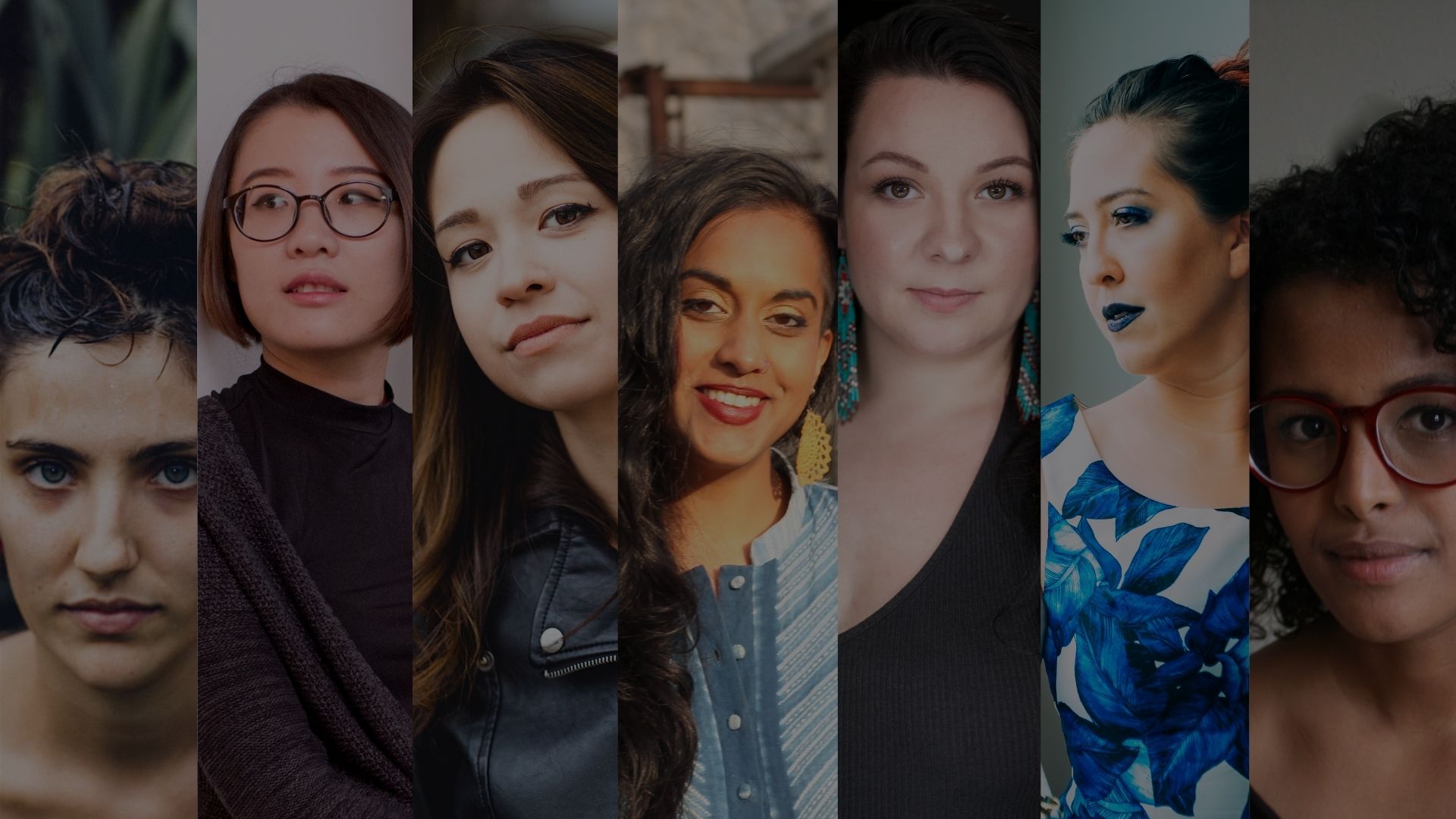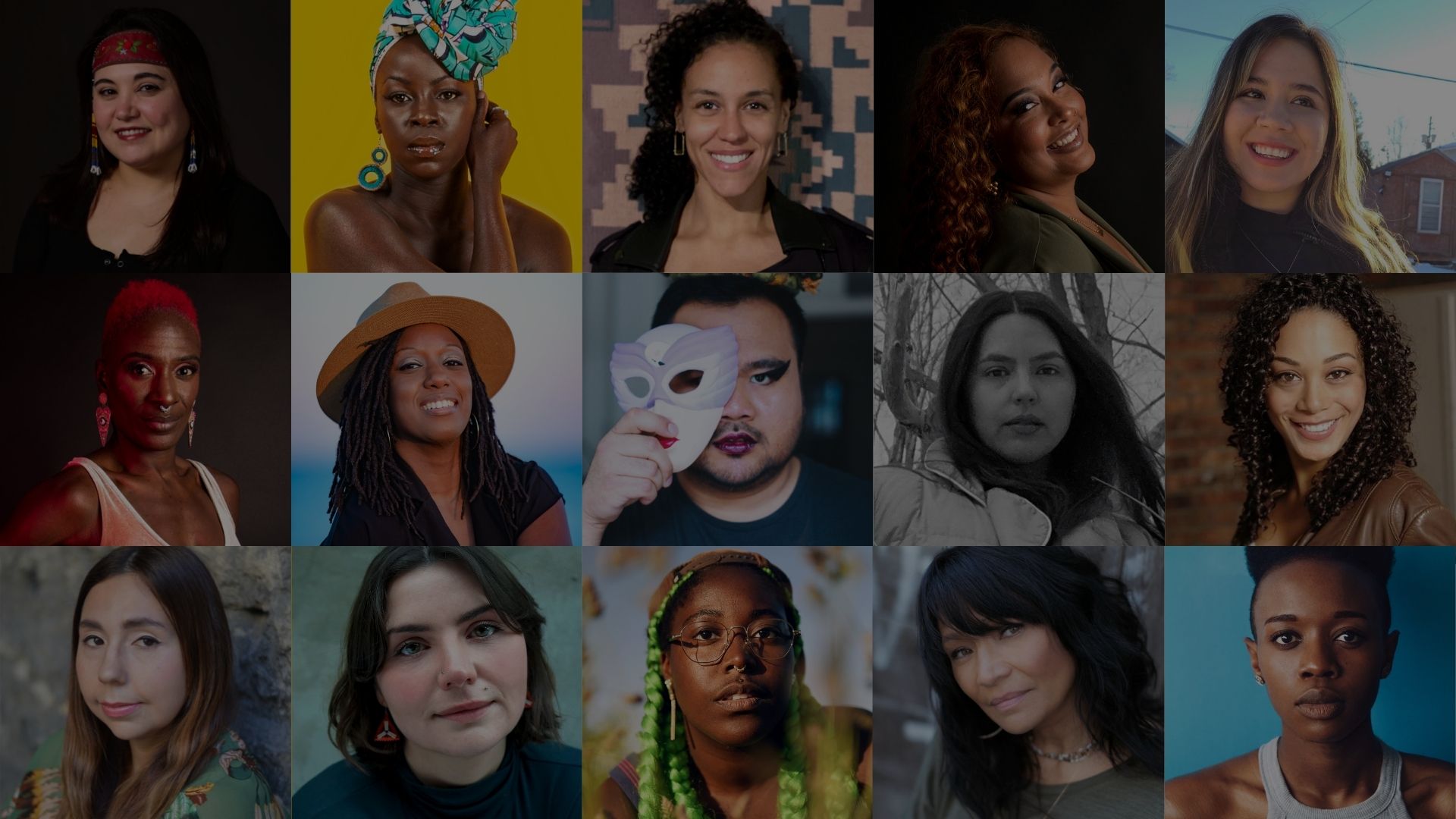OLIVIA: However, it’s really great. I guess we could have coffee at like, “Fika” is really nice that’s a very cute café —
ELISHEBA: I mean we have “Fika” here it’s a Swedish, Swiss?
OLIVIA: Swedish, yeah.
ELISHEBA: Café yeah. Oh, it’s great. They have this cardamom bun I’m obsessed with.
OLIVIA: [laughs] Done.
RIMAH: Olivia, I’m really curious to know, how did you hear about ThisGen Fellowship?
OLIVIA: Facebook. And I knew about Why Not Theatre because I had met Ravi, a year or two before? Must’ve been a year before, because it was in 2018 that I met Ravi, actually in New Orleans — which is where Elisheba, I met Ty Defoe. And I had done this art equity facilitator training program, and so Ravi was an alumni of the program. So I met Ravi, found out about Why Not and then kind of followed them on Facebook. And it was literally, I saw it on Facebook and was like, “I will apply for this.”
RIMAH: Oh, great. Elisheba, is this the first time you mentor an artist remotely?
ELISHEBA: Yes, remotely, yeah. But it’s not my first time mentoring.
RIMAH: How did you create that curriculum for your time with Olivia? I mean, what was important for you to pass on?
ELISHEBA: I think that, Olivia, correct me if I’m wrong, but I think we had a meeting before things really kicked off because it was like, “let’s just get to know each other, let’s see what we’re about.”, and it was for a great time for me to, like, yeah, hear what Olivia is interested in. I don’t want to craft something that the mentee is, like, not into because it’s — just, that’s just going to be brutal for both of us. And I’ve learned that from experience. So I think yeah, we just, we had a conversation where there’s no agenda it was just like, “I want to hear what do you want to get out of this?”
RIMAH: Mhmm. So, for you, Olivia, what was like the most successful or exciting thing you discovered about yourself as an artist and about sound design as a career? I know this is a big question but —
OLIVIA: It is because — I feel like, to some degree, feels like an early time to ask that question, only because I haven’t done a ton of sound design and most of the things I’ve been making lately have been for myself. So it’s like I’m the director, and the creator, and the sound designer, so I don’t have anyone to fight — not that you’re gonna fight with anybody but —
ELISHEBA: You can still fight within. [laughs]
OLIVIA: That’s true! That actually is true, that’s a real thing. Yeah, I know what my aesthetic is in certain ways; like, I do a lot of improvising as a performer. But I still haven’t figured out yet my full voice as a sound designer and what it, what this will all mean to me and what I think success will look like currently as a sound designer.
RIMAH: I did some internship in the past and I see mentorship is, is not one-way relationship. I don’t know if you agree with me, Elisheba? And I’m really curious if there is something you discovered about yourself as an artist while mentoring Olivia?
ELISHEBA: Yeah. I do agree with that. … what have I earned? I like to mentor people in general because I feel like I’ve learned quite a bit as I’ve, you know, embarked on this career. And I’m very thankful to people who took time out to like, talk to me about how this works and how they do things. So I guess it’s, it’s this big idea of like paying it forward. Yeah, people were very generous with their time, I would like to be generous with my time. It’s also very important to me more and more, I want to mentor, help out people who are women, women plus, and or BIPOC folks because it’s just a little bit harder for us to, to get like a footing in this world. So I feel really lucky, fortunate to be where I am, and I just want to help other people. Specifically, like with Olivia, it’s just I’ve had a really good time talking with you Olivia. I’ve had like, because you’re, you are more advanced, like we can have kind of a really, easy, like back and forth. You’ve designed some things now, you’re not like coming from nothing. Yeah, I’m getting a lot from these conversations; it feels like there’s an easier back and forth.
RIMAH: I saw your little baby [small laugh] and I feel like for female artists, still, parenting is a challenge. Do you agree with me?
ELISHEBA: Yeah, yeah, it can be. And there are just some things, especially when babies are really tiny, you know, big thing being like breast milk. Like, my husband cannot make milk — that is me. So it’s an extra thing I have to do.
RIMAH: Mhmm
ELISHEBA: Breastfeeding is something that takes — it is a full-time job. So, I also, I have a full-time job, which is sound design,
RIMAH: Yeah
ELISHEBA: plus this full-time job of breastfeeding slash pumping — it’s just like, yeah, by the end of the day I am exhausted. And then also just like theatre is not also, I mean, like society on a whole is, like, pretty brutal to new moms, to women. You know these long days, you know, oftentimes I’m working till midnight on a show and then by the time we get done with, like, notes from the director, with your crews and everything, you’re leaving the theatre at close to 1a.m. And, and, you know, what’s tricky now is like we’re having this conversation about parenting and theatre — I actually haven’t yet done a theatre show with the baby because you know, I had a few shows lined up that should have happened by now but pandemic so…
RIMAH: Yeah, I think it’s for you, good timing to have the baby while the pandemic is happening.
ELISHEBA: [small laugh] Right, right, yeah.
RIMAH: Yeah. Olivia, I know you’re not so far in the fellowship — you are now halfway through the phase one — but maybe this gave you a little bit of sense how the fellowship will benefit you in the future.
OLIVIA: Well, yeah. It has given me structure in a way that works well for me which is, I like a little bit of structure, but not necessarily a lot of structure [small laugh]. Also, because sometimes that’s the way my brain ends up working is, I’m sometimes all over the place and then sometimes I’m very focused. And, I’ve really, that’s why I really appreciate fellowships versus, when I’ve been in very academic situations like school. Because I went to the “University of Toronto” and realized it’s just not my — school’s not really my jam. I think it would have to be a very specific program. Whereas at least with fellowships and, like, a program like this, I can take things at my own leisure, in my own way, at my own pace, in my own timeline, and has made learning more fun. Even though there are still expectations to a degree; like we check in; and you know whether it’s like, checking in with Why Not or talking to Elisheba, or going to these master classes that we’ve been having; there’s still like a level of flexibility, and I think I just appreciate that.
RIMAH: This will lead me to a question, because I feel like every artist, they have their own process, and I’m really curious about your process.
OLIVIA: Well, as far as sound design has gone, so far the very first show I did, I was playing in it as well, and I was improvising. So I came to rehearsals with my instruments and I brought, like, I predominantly play saxophone, so I brought that. But then I had a bunch of other things with me just to make noise, and I would record whatever noises I was making while stuff was happening [small laugh]. And sometimes I was like, “this is great!”
[RIMAH laughs]
OLIVIA: And then other times I was like, “that was awful! I shouldn’t have done that.” [small laugh] That’s very much, from my practice as a musician, is just the thing I’ve always kind of done when I’ve been making things — is just like, “let’s try stuff and see how it works.”
RIMAH: Great. Elisheba, you recommended to Olivia to read the play “A Raisin in the Sun” by Lorraine Hansberry. Why this play?
ELISHEBA: I was looking back to just, like, the day that I was like, “oooh! What about this?”, and I think it was on May 30th? May 31st? And a few days before that in Minneapolis George Floyd was murdered. And also here in New York there was, this bird watching incident of, a Black man in Central Park telling a white woman, “hey you need to keep your dog on his leash.” And the white woman — it’s a really chilling video of her calling the police on him and then, pretending that he’s attacking her. I wanted to pick a play that we could read together because Olivia is an amazing composer, and is like coming at sound design, it feels like you generate stuff based on, like, stuff that’s currently being generated. You’re very much working kind of in the “new developing works world”, “new play world”. And it was like, “oh, let’s work on analysis. Let’s read a play and, like, analyze it together.” So I was coming up with a list of, like, “these are some plays that are, like, have really strong “beginning, middle, ends” are very linear” And I was thinking like, down the road if we read another play, maybe we could read them, like, more “bizarro” play that plays with, with like, form and structure. And, yeah, then this happened at the end of May and I don’t know, “Raisin in the Sun” was on the list, and that’s the one that just kind of popped up and was like, “oooh! This one.” I mean, yes, it is ultimately about racism and how — and white supremacy. Yeah! It just, it, for that reason it just kind of, like, popped up, and it was like, “actually now. This is when we read this one.” And then also when you get down to it, I think it’s a really great story.
OLIVIA: And there was something you had said — I remember in our first meeting, you were talking about the idea of, like, finding something in this more traditional structure, since I haven’t done that. I remember you were talking to me but also, I think, thinking to yourself, like, should you pick a play that’s, like, really standard, like, in the canon which could end up being written by a white man, and you were really thinking about this, and trying to figure out like what would be a good play.
ELISHEBA: Oh yeah!
OLIVIA: And then you eventually suggested this.
ELISHEBA: Oh, thank you for reminding me of that! That was such a big thing of me generating the list! And actually I passed the list around amongst the other Why Not mentors, and there was a little bit of back and forth over “the list”. But it was, like, it was such a big thing, I, because, I’ve come up through the American education system, and I’ve been interested in theatre for a while but, yeah, like, you read a lot of, like, dead white dude’s plays [laughs]. And, like, we could have started that way, but what if we didn’t? How different would my theatre life look like if the first theatre play I had to analyze was yeah, not, not Shakespeare?
RIMAH: Yeah. But do you collaborate with the other mentors? You consult each other?
ELISHEBA: Yeah! We had a really good conversation. If I look back I think it was like a “20 email back and forth”, like, “oh what about this? And what if this? —” And that’s where, like, a couple people pointed out, like, “this is a very American list, and we are Canadian.” [small laugh] And I was like, “oh my god, you’re right!”
RIMAH: It definitely, it’s really a hard time for theatre now — I really miss being in a theatre room. But I was reading an article titled, “Audio Drama and Imagination”, edited by Fryer Real, and I was really intrigued by a concept called, “theatre of the mind”, when the writer describes that mental images evoked by sound create a “theatre of the mind”. And this concept is used in an audio drama performative piece in public space. What role do you see audio performance playing in the COVID era? Do you see it as an alternative to theatre for, for the moment?
ELISHEBA: Yeah, I mean, we’re seeing — right now I’ve had a lot of people reach out, you know, “I, we can’t do our theatre season, you know, IRL, where we’re gonna do these radio plays”. I’ve had several, several theatres reach out to me. And a lot of it is really exciting. It does mean we have to, like, re-shift, within, within theatre — and I’m specifically talking about American theatre, I don’t know what it’s like within Canadian theatre — but the sound designer is a little lower within the hierarchical structure of things. And oftentimes, there have been plenty of times where I’m kind of, I’m the last person hired. And so, sound is often the last thing thought about. So if you’ve already created, like, your set, your set design, and you didn’t keep the sound designer in mind — they’re just times where I’ve had to, like, really fight tooth and nail to get a small speaker, you know, routed through the scenery, to get this, like, hole cut in the scenery to, like, get this, the speaker in. I love it when I’m brought in at the beginning, so we can all have this, like, conversation together, collaboration together, so we can incorporate sound into the scenery, whatever that may look, sound like. So going back to, to this like, “audio of the mind”, radio plays, podcasts, with I, I work a lot within podcasts and radio world, and what I love about it is that sound is the first thing we think about. So with theatres I’m really excited for us to be doing radio plays and like audio projects, and I am encouraging people like, “now really think about sound first and foremost. It is not an afterthought. As you all are figuring out what this is, include that sound designer in, credit them like they should be listed first and foremost. They are a co-creator of that experience.
RIMAH: I wouldn’t really keep you long because I know you both are busy. My final question to you will be, I’m really curious about your next projects, or the projects that you are busy with now.
OLIVIA: I got a commission, the “Canada Council for the Arts” had this “Digital Strategy Grant” , and a violin cello duo, that I know — it’s like through a friend of a friend from the time I went to Banff — I’m working with them on a piece. And we just got word that we got the money and so now I’m officially commissioned. So I’m working on that with them. And it’s all about water sounds, and, because we’re in three different locations; so I’m in Toronto the cellist is in Vancouver, and then the violinist is in London, England; and so I had them like record some sounds from their bathtubs. And, like, the one in Vancouver — the Chelsea, Vancouver — she lives right by the oceans, I was like, “can you record some sounds from the ocean?” [small laugh]
RIMAH: Thank you.
ELISHEBA: I am working on several, podcasts, audio projects at the moment. Most of them I have, like, I’ve signed NDAs for, so I can’t get too into them on the podcast. But, my days are kept busy working on these audio projects. And then I have my main podcast that I’ve been on for a few years now, “Masterpiece Studio”, which is like a podcast that works in conjunction with “Masterpiece Theatre” on PBS. So for like, the fancy British dramas that are out there, like if you, if you’re watching an episode of that on Sunday night, you know, we’re done, I think the episode is done by like 9p.m., and then we drop a podcast episode that gets maybe a little bit into, you know, behind the scenes on that episode, or we could do a deep dive with a key actor from that episode, or the director, or a writer. Yeah.
RIMAH: Well, thank you very much for this nice conversation. And I wish you all the best. And stay cool — you can put your AC on now.
[OLIVIA and ELISHEBA laugh]
RIMAH: That was ThisGen podcast created by Rimah Jabr. If you would like to know more about ThisGen Fellowship, please check Why Not Theatre website at whynot dot theatre. Thank you.






